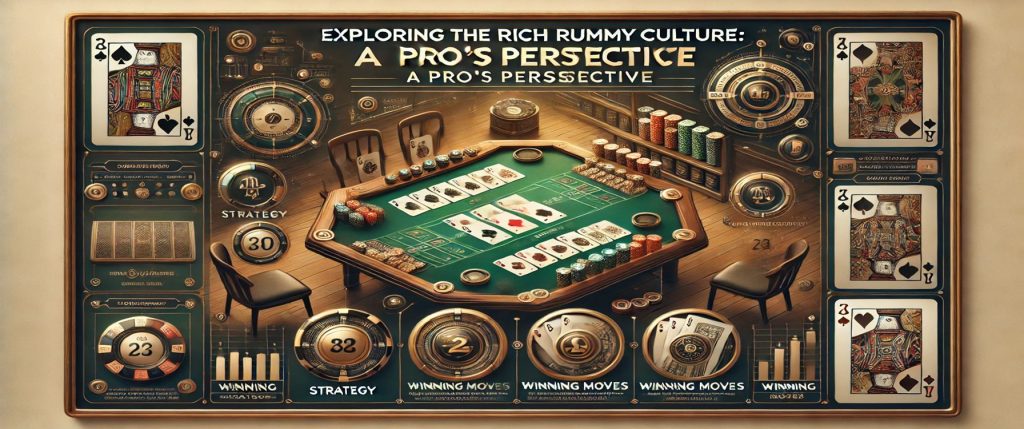
The Complete Guide to Rummy: Background, Variations, Strategies, and More The card game rummy has a long history dating back to the early 1800s and has enthralled players for centuries. Although its exact origins are unknown, some theories contend that it may have developed from earlier games like the Mexican game “Concentration” or the Chinese game “Dominoes.”. Rummy originated from the game of “Concentration,” which was played in the United States in the early 1900s, according to the most widely accepted theory. As rummy became more and more popular, it started to take on various shapes and regulations, which resulted in the variety of variations that exist today. With each culture contributing its own twist, the game swiftly expanded throughout the world, improving both its gameplay and appeal. As rummy developed, it became a mainstay of family game nights and social events.
The popularity of the game in America was further boosted in the 1930s with the introduction of Gin Rummy, a simplified variant that placed an emphasis on skill and speed. Rummy underwent a dramatic transformation in the years following World War II, when it gained popularity among both soldiers and civilians. With the introduction of mass media and television, rummy became a popular card game and spread throughout the country’s homes. Rummy is no longer merely a game of chance; rather, it is a strategic undertaking requiring talent, intelligence, & a grasp of human psychology. There are many variations of rummy to suit varying tastes and skill levels, so it’s not a rigid game.
Gin Rummy is a very popular variation that is usually played by two players. In this version, players try to minimize the number of points in their hands while forming runs and sets. The game is a favorite among competitive players because of its fast-paced gameplay and strategic depth.
Indian Rummy is another well-known variation that frequently has more than two players and is played with two decks of cards. This version adds layers of complexity and excitement by emphasizing the melding of cards into legitimate sets and sequences. Other noteworthy variants include Canasta, which adds strategy and teamwork components, & Kalooki, which adds wild cards to the mix.
There are subtleties and rules specific to each variation that can drastically change gameplay. In contrast to Gin Rummy, which emphasizes solo play & short rounds, Indian Rummy promotes player cooperation and strategic alliances. Players can experiment with various styles and tactics thanks to this diversity, which also keeps the game interesting and guarantees that there is always something new to learn & become proficient at. Acquiring proficiency in Rummy necessitates not only good fortune but also a deep comprehension of psychology & strategy. Observing the cards that opponents discard is a crucial piece of advice for players.
This can help you predict their movements and give you important information about their hands. An opponent may be attempting to form a specific meld if, for example, they routinely discard cards from a certain suit or rank. You can decide which cards to keep and which to throw away by identifying these patterns.
Managing your hand well is another essential component of rummy strategy. Holding onto cards that can be used in a variety of ways will help players keep their options open. As the game goes on, this adaptability makes it possible. Achieving a balance between creating your own melds and interfering with your opponents’ plans is also crucial. You can obtain a big advantage in the game by carefully discarding cards that might help your opponents while keeping those that will allow you to finish your own sets.
With multiple tournaments held all over the world, rummy has evolved from a recreational game to a competitive sport. From novice enthusiasts to seasoned pros, players of all skill levels are drawn to these tournaments. Knockout rounds and Swiss-style pairings are two common tournament formats that let competitors show off their skills in a controlled setting. The excitement of competition gives the game a thrilling new dimension since players have to adjust to their opponents’ unpredictable tactics in addition to using their strategic skills.
For players looking to improve, taking part in rummy tournaments can be a rewarding experience. Players are encouraged to improve their skills by the cash prizes & trophies offered by many tournaments. Also, among players who are passionate about the game, these gatherings help to create a feeling of community. As players share strategies & advice and make friendships that go beyond the tournament, networking opportunities are abundant. Rummy tournaments provide a fun environment for development and friendship, regardless of your level of experience.
The ability of Rummy to unite people is among its most alluring features. Rummy is a game that promotes social interaction and bonding, whether it is played at parties, family get-togethers, or informal get-togethers with friends. Due to the game’s comparatively easy rules, players of all ages and skill levels can participate and have fun when playing. Players laugh and converse freely as they compete amicably, fostering a sense of community that improves the whole experience. Also, Rummy promotes communication and strategic thinking among participants. Participants gain a better understanding of one another’s mental processes as they talk about their moves and exchange ideas about their tactics.
As players learn to value one another’s viewpoints, this interaction not only improves the gameplay but also fortifies bonds between players. Rummy is a classic game that encourages people to connect and socialize with one another in an increasingly digital world where in-person interactions are becoming less frequent. The impact of rummy goes beyond card tables; it has appeared prominently in popular culture through music, literature, and film. Rummy has appeared as a major theme or plot device in a number of movies, illustrating its function as a social activity that unites characters or as a metaphor for the unpredictable nature of life. As an illustration of how Rummy can represent human emotions and relationships, scenes in classic movies frequently feature characters playing intense games of the game at crucial junctures.
Rummy has been used by writers as a metaphor for strategy and slyness in their works of literature. The game’s mechanics frequently represent the difficulties of real life, where players must make thoughtful decisions while navigating uncertainty. Also, Rummy’s essence as a cherished hobby that appeals to audiences of all ages is captured in songs that make reference to it. These cultural depictions highlight the game’s importance as a universal experience that cuts across space & time, in addition to celebrating its timeless appeal. With the development of online platforms that enable players to interact with people worldwide, rummy fans have entered a new era.
Because online rummy is so accessible and convenient, players can play their favorite game whenever and wherever they want without having to deal with actual cards or opponents. Different Rummy variations are available on a variety of websites and mobile applications, satisfying a range of tastes & offering guidance to novices who want to learn the game. Also, to improve the gaming experience, online platforms have added cutting-edge features like multiplayer modes, live tournaments, & interactive chat options. Gamers can take part in planned tournaments with cash prizes up for grabs or compete against other players in real time. In addition to increasing Rummy’s popularity, this digital revolution has produced thriving communities where players can interact with others who share their enthusiasm for the game. With continuing trends and innovations influencing its development, rummy seems to have a bright future.
Growing artificial intelligence (AI) integration into online platforms is one noteworthy trend. Algorithms powered by AI are able to examine player behavior and offer tailored suggestions for enhancing gameplay tactics. While providing experienced players with fresh challenges to overcome, this technology improves the learning process for novices. Online rummy platforms are also increasingly incorporating gamification features. By introducing levels of competition beyond conventional gameplay, features like leaderboards, achievements, and reward systems promote player engagement.
As virtual reality (VR) technology develops further, we might even witness immersive Rummy experiences that allow players to interact in virtual settings while simulating the social ambiance of real-world card games. These developments promise to maintain Rummy’s relevance in the rapidly evolving gaming industry while upholding its fundamental principles of social interaction & strategic thinking. To sum up, Rummy is a complex game that is woven from history, culture, strategy, and community; it is more than just a simple card game.
Its rise from modest origins to an international sensation illustrates its timeless appeal for people of all ages. Rummy will maintain its place in our social lives & popular culture for years to come, whether it is played competitively in tournaments or casually among friends.





